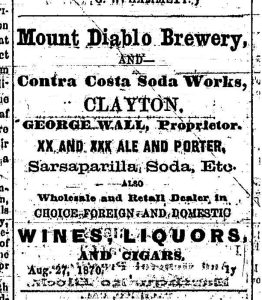Mount Diablo Brewery quenched thirsts but drowned in legal obstacles
 CLAYTON, CA (Feb. 27, 2023) — Coming down the eastern hills from Black Diamond Mines, hardworking men seeking to slake a thirst had a choice of several Clayton saloons to patronize in the 1860s and ’70s. But George Wall’s brewery and saloon would have been the first establishment that came into view as they crossed the bridge at Mount Diablo Creek.
CLAYTON, CA (Feb. 27, 2023) — Coming down the eastern hills from Black Diamond Mines, hardworking men seeking to slake a thirst had a choice of several Clayton saloons to patronize in the 1860s and ’70s. But George Wall’s brewery and saloon would have been the first establishment that came into view as they crossed the bridge at Mount Diablo Creek.
His Mount Diablo Brewery was said to be a “pioneer,” the first of its kind in Contra Costa County. It was located at the east end of Main Street to take advantage of the clear creek water.
Wall’s cream ale was his best seller, described in an 1861 Contra Costa Gazette story as “a first-rate article.” Cream ales were born in America in the 1850s as a response to the desire for a beer that was lighter than the mass-produced German style beers. “Cream” refers not to the dairy product but rather to the ale’s aroma. It was similar to a pale lager and valued for its dry, refreshing taste and high alcohol content.
Various cream ales are around today in styles reflecting specific locales and having unique flavors based on brewing methods, added ingredients and the use of barley, corn or rice.
But many problems plagued the Mount Diablo Brewery during the 12 years of Wall’s tenure: disputes with a partner, the growing temperance movement and the Local Option License.

Richard Westoby joined Wall in 1863 but dissolved the partnership in 1865 due to disagreements over finances. Wall ran the business on his own for the next eight years until 1873, when Westoby won a $3,000 judgment against him. In order to pay his ex-partner, he held a “Sheriff’s Sale” at noon on May 27, 1873, in front of the Martinez Court House. Wall’s Clayton property was sold to the highest bidder.
The temperance movement, advocating restrictions on the manufacture and sale of alcoholic beverages, was becoming more influential in California, and the Local Option License of 1874 was seen as a means to achieve prohibition. The provision allowed localities to decide their own policies regarding alcoholic beverages, thus avoiding conflicts on the state level. Township #4, comprised of Clayton and the mining towns of Nortonville and Somersville, was declared “dry” by election, and George Wall was convicted of violating the law.
His was the “test case” in August 1874, when the constitutionality of the law was questioned in the state Supreme Court. In October of that same year, the law was declared unconstitutional by a bare majority, but Wall was too broke to celebrate. He had lawyer fees and fines to pay in addition to what he owed Westoby, and his Mount Diablo Winery became history.
For more information on the Clayton Historical Society or to become a member, visit claytonhistory.org. The Clayton Museum is open 2-4 p.m. Wednesdays and Sundays at 6101 Main St.. Admission is free.

Debbie Eistetter
Debbie Eistetter has been a resident of Clayton for almost 30 years. She serves on the Board of the Clayton Historical Society and believes that history shows us the way to a more enlightened present and hopeful future. For more information about the CHS Museum please visit claytonhistory.org
